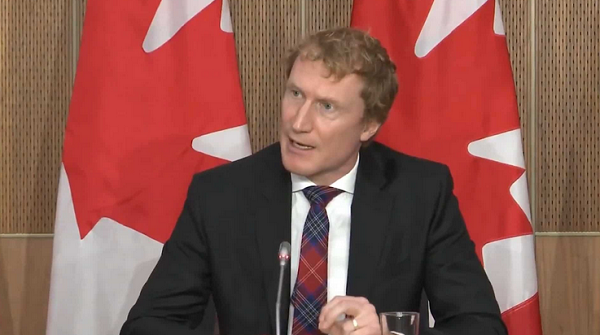Ontario’s colleges against the cap on visas for international students
Calling the federal government’s new restrictions on international students “a moratorium by stealth,” Ontario public colleges are warning that many thousands of students will soon be left in limbo, their hopes on hold.
The public statement released Thursday by Colleges Ontario, which represents the province’s 24 taxpayer-funded colleges, is the most critical response yet from the post-secondary education sector to changes announced this week by Immigration Minister Marc Miller to rein in a system that he’s previously said had “lost its integrity.”
“The decision has been rushed, resulting in a confusing and damaging early rollout. We urge the federal government to immediately engage with us and our provincial government in a meaningful conversation about the material impacts on students and Canada’s reputation,” said the four-page statement.
“Ontario’s public colleges are very concerned about the attacks on a high-performing, efficient public college system — impacting our reputation with potentially long-lasting negative repercussions.”
Public colleges in Ontario, which have seen an exponential growth of international enrolments over the past few years, had kept silent since October, when Miller started rolling out a series of changes to the international student program in response to public pushback about high levels of immigration and criticisms of its impact on affordable housing.
In December, a new system was put in place to authenticate schools’ letters of admission, followed by a doubling the cost-of-living financial requirement for study permit applicants on Jan. 1 to $20,635, in addition to their first year of tuition and travel costs.
Miller’s reforms
On Monday, after weeks of floating the idea of capping the number of international students in Canada, Miller imposed a two-year cap on new study permits issued in 2024, with an aim of reducing the number issued by 35 per cent from 2023’s level, to 364,000. The cap, however, won’t apply to students for master’s and doctoral programs or in elementary and secondary schools; the intake level will be reassessed in 2025.
Miller also immediately implemented a requirement of a letter of attestation from provincial governments to accompany all study permit applications even though, other than Quebec, no provinces have the process in place for generating such letters.
Starting Sept. 1, Ottawa will also stop issuing post-graduation work permits to international students who complete programs provided under so-called Public College-Private Partnerships. Further, the spouses of most international students will no longer be granted work permits, with the exception of those studying in graduate schools or in a professional programs such as medicine or law.
The public-private college partnerships, which allow graduates from private colleges to receive a public college credentials and coveted post-graduation work permits, are sanctioned by the Ontario government and have become a growing concern for the quality of education delivered through some of the private partners.
“It is not the intention of this program to have sham commerce degrees and business degrees that are sitting on top of a massage parlour,” Miller said, as he announced the hard cap Monday.
Colleges call changes ‘too rushed’
In its statement Thursday, Colleges Ontario said the federal government has not consulted with its members on these “significant” changes, calling the cap “a moratorium by stealth” that is already causing significant and unnecessary upheaval for students, employers and communities.
It said public colleges have a year-round intake of students and many are well into the application process, ready to start in May in programs for key sectors of Ontario’s economy.
“The federal government’s process is too rushed,” said Colleges Ontario. “The imposition of an immediate requirement for a letter of attestation from the provincial government is halting all student visa processing right now. … This new and unexpected administrative hurdle has resulted in total chaos for students. The entire system for Ontario is frozen.”
Students who had already been accepted into programs — and had paid their fees for those programs — are having their applications for study permits returned to them, it said, often without any explanation or way forward.
“This situation was entirely avoidable and is entirely arbitrary,” it said.
Labour market needs
It said college graduates fill key needs across sectors that include advanced manufacturing, mining, the electrical vehicle industry, early childhood, health care, housing construction and others upon which our economy depends. Yet, the exemptions for students in master’s and PhD programs from the cap don’t reflect the current and future demands in Ontario’s labour market.
“The minister’s one-size-fits-all announcement is a blunt instrument that will greatly damage the good actors in college education and may not do much to rein in the bad actors,” warned Colleges Ontario, saying its members are heavily regulated and operate to the highest standards. “This blunt instrument is not the way to improve quality in the public college system.”
All these changes, it cautioned, could have massive and long-lasting negative effects on domestic students, programs, services and campuses, as well as on communities where international students are a key source of talent and rebalancing aging populations.
Members of Colleges Ontario are calling for the federal government to delay the implementation of the requirement for a letter of attestation until provinces have their processing mechanisms in place. They are also asking that exemptions to the study permit cap be extended to international students in high-demand programs.
Last but not least, the public colleges want the province to allow them a modest $135 increase in per-student annual tuition and to raise provincial grants by 10 per cent as recommended recently by a blue-ribbon panel created by the Ontario government to look at the financial future of post-secondary institutions.
This article was reported by The Star















